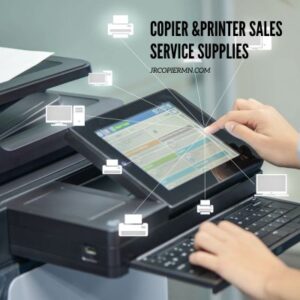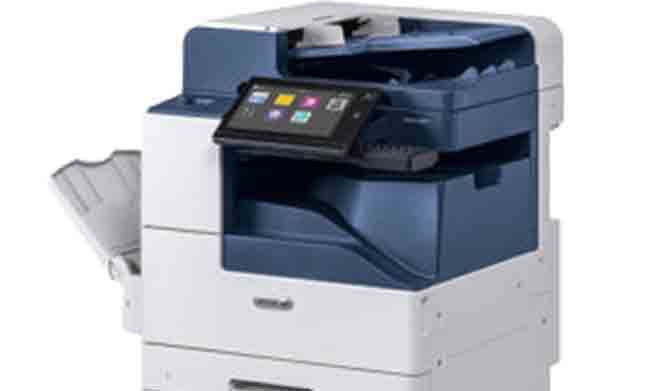Copier Sales
You’re about to dive into the world of copier sales! We’ll help you understand various types of copiers, assess your business’s specific needs, and arm you with top-notch strategies for successful negotiations.
Don’t be daunted by common challenges; instead, let’s turn them into opportunities together. With our guidance, you’ll not only increase your sales but also become a more knowledgeable player in the tech market.
Let’s get started!
Understanding Different Types of Copiers
Let’s delve into the various types of copiers you’ll encounter in the market. These machines are formidable allies in your efforts to optimize productivity, and understanding their nuances is key to making an informed purchase.
First off, digital copiers have become a staple due to their efficient Copier Technology Advancements. They’re versatile tools that not only copy but also print, scan, and fax documents. Plus, they offer easy integration with network systems for seamless data management.
Next up are multifunction copiers. True to their name, these devices do more than just copying; they can print, scan and even send emails! With these all-in-one solutions, you’ll streamline your workflow like never before.
Lastly, let’s not forget about analog copiers. Despite being overshadowed by newer technologies, they still hold sway in businesses where high volume copying at lower costs is the order of the day.
Remember though that each type requires specific Copier Maintenance procedures to ensure longevity and peak performance. So when choosing your ideal match from this diverse lineup of copiers out there – consider not only its capabilities but also maintenance demands! After all, it’s about finding a companion that fits seamlessly into your workspace family.
Evaluating Your Business Needs for a Copier
You’ll first need to evaluate your business needs before deciding on the right copy machine for your office. It’s not just about picking the flashiest equipment, but more about aligning it with your operational requirements and budget.
A thorough cost efficiency analysis is crucial in this process. Think about how much you’re willing to invest initially and long-term. Also, consider copier maintenance essentials like toner replacement costs or potential repair expenses.
Consider these four factors:
- Volume of Printing: How many pages do you print daily? Larger businesses might require high-speed copiers capable of handling hundreds of pages per day.
- Type of Documents: Do you mostly print text-based documents or images? Color copiers are ideal for businesses that need vibrant prints.
- Networking Needs: Do you want a standalone device, or one connected to multiple computers? Network-enabled copiers allow employees to print directly from their workstations.
- Space Constraints: Will the machine fit comfortably in your workspace without causing any inconvenience?
Tips to Increase Copier Sales
Boosting your revenue in the office equipment sector isn’t rocket science; it’s about understanding customer needs and offering value-added solutions. The first step is to know your target audience inside out. What are they looking for? Speed, durability, or perhaps multi-functionality? You’ve got to present them with a copier that’ll make their life easier.
One foolproof way of enhancing sales is through effective sales training. It’s not just about knowing the product, you also need to understand its relevance in a buyer’s world. The more informed you are, the better you can meet customer needs.
| Customer Needs | Copier Solutions |
|---|---|
| High-speed copying | Advanced speed copiers |
| Durability | Robust design |
| Multifunctionality | All-in-one models |
The table above shows how different copier features cater to unique client demands. So remember this: when it comes to increasing copier sales, it’s all about matching customer needs with the right products. But don’t forget – belongingness matters too! Make sure your customers feel valued and part of your business family. Emphasize on their importance in every interaction – that’s the secret sauce of enduring success.

Common Challenges in Copier Sales
Despite your best efforts, you’re likely to encounter several hurdles in the office equipment sector. Sales objections and client education are two of the most common challenges in copier sales. But don’t worry! You belong to a community that thrives on overcoming adversity.
Here’s a list of some issues you might face:
- Technical Complexity: Copiers aren’t simple machines; they’re high-tech devices with advanced features. This complexity can intimidate clients, leading to sales objections. Your knowledge and ability to simplify these complexities will make a difference.
- Maintenance Concerns: Clients fear unexpected maintenance costs or downtime due to repairs. Offering comprehensive service packages can alleviate these concerns and build trust.
- Cost Objections: High upfront costs can scare off potential buyers. Flexible financing options can help overcome this hurdle.
- Resistance To Change: Many businesses resist change, even when it benefits them in the long run because they are used to their old ways or machinery.
As a salesperson, you’re not just selling a machine – you’re providing value and solutions for businesses’ needs while educating clients about the benefits of adopting new technology. With patience and persistence, these challenges won’t stand in your way!
Strategies for Successful Copier Sales Negotiations
Navigating through successful negotiations in the office equipment sector requires a blend of strategy, understanding, and communication. As a salesperson in copier technology, you’re already aware that this isn’t an easy task. You need to be armed with negotiation techniques that not only persuade clients but also foster a sense of belonging.
Firstly, understanding your client’s needs is crucial. This means knowing what they value most – be it cost efficiency or top-notch features. Once you’ve figured out their needs, demonstrate how your product aligns perfectly with them.
Client persuasion comes into play here. Use facts and figures to show how investing in your copier will benefit their business operations in the long term. Illustrate how advanced features like duplex printing or high-speed scanning can enhance productivity while saving costs.
Next up is building trust; this often overlooked aspect plays a huge role in securing deals. Make sure you’re transparent about any service agreements or warranties associated with the machine.
Lastly, be flexible but firm during negotiations—be open to making adjustments but know where to draw the line for mutual benefit.
Frequently Asked Questions
What Are the Best Brands for Commercial Copiers on the Market?
You’re likely seeking copiers that balance superior performance with environmental responsibility and strong security features. Canon, Ricoh, and Xerox are top brands delivering on these needs while fostering a sense of belonging among users.
What Is the Average Lifespan of a Copier Machine?
You’re curious about a copier’s lifespan. Typically, they last 5-10 years. However, recent innovations and awareness of environmental impact have led to longer-lasting machines. It’s crucial to choose wisely for longevity.
What Kind of Maintenance and Servicing Does a Copier Machine Require?
Your copier needs regular maintenance. You’ll have to replace ink cartridges, ensure proper paper handling, and schedule periodic servicing for optimal performance. It’s like caring for a car – regular check-ups keep it running smoothly.
How Does the Photocopier Technology Work?
You might be curious about how photocopier technology works. It’s simple – light reflects off an original document onto a photosensitive drum, creating an image that’s transferred to paper with heat and pressure.
Is It Better to Lease or Purchase a Copier for a Small Business?
You’ll want to consider both tax implications and financing options. Purchasing a copier offers potential tax benefits, but leasing provides flexibility for your small business as technology evolves and financing needs change.
